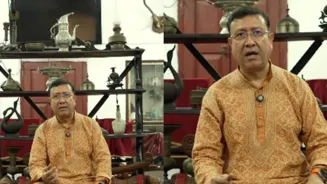When people speak of Lucknow, the conversation almost always turns to the Nawabs, their grandeur and their lasting imprint on the city. But as Sheikh Aamir Raza, a descendant of the Sheikhzada family of Lucknow, reminds
us, the city’s history stretches much further back, into a chapter often overlooked in popular memory.
“In Lucknow, people often talk about the Nawabs, but no one really talks about what existed in the city before the Nawabs,” Raza said in an Instagram reel, shedding light on a lineage that predates the celebrated Nawabi courts.
Before the rise of the Nawabs, Lucknow was defined by the Sheikhzadas. Among the earliest arrivals was Sheikh Adam San’ani, followed by Sheikh Abdur Raheem Bijnori, who, according to Raza, was appointed as the first Subedar (Governor) of Awadh by Emperor Akbar. His final resting place is today known as Nadan Mahal, a site that still stands as a quiet reminder of that era.
“When Sheikh Abdul Rahim Bijnori came to Lucknow, he built a massive fort, which over time came to be called Machhi Bhawan,” Raza said. This fort would remain a focal point of power and identity for the Sheikhzadas.
The historical thread stretches directly to one of Lucknow’s most prominent landmarks. “Today, where Machhi Bhawan once stood, the magnificent King George’s Medical College was built,” Raza said.
Even today, the Sheikhzada family holds tangible connections to its past. “In our possession, we still have 29 royal orders (farmans), including those issued by Emperor Akbar and Shah Jahan, both connected to our family,” Raza shared with pride.
Lucknow’s pre-Nawabi history is also intertwined with dramatic moments in the Mughal era. Raza recalled a famous story. “When Humayun was defeated by Sher Shah Suri and fled Delhi to save his life, he passed through Lucknow. At that time, the Sheikhzadas of Lucknow came to his aid, providing him with 50 horses and Rs 10,000,” he said.
Watch the full clip here:
For Raza, speaking of this history is not just about nostalgia but about reclaiming a forgotten identity. With grace and pride, he continues to stand as a living descendant of the Sheikhzadas, custodians of a heritage that shaped Lucknow long before the Nawabs ever arrived.
















